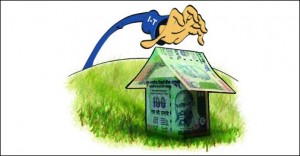Exemption under section 54 cannot denied to the assessee due to failure in purchasing new residential property within three years
 It has been recently held in the case of Sri Prasad Nimmagadda vs. DCIT, Hyderabad, 2013-57-ITAT that an assessee’s claim of exemption under section 54 of the Income Tax Act cannot be denied on the ground that construction of a residential house could not be made within the period of three years from the date of sale of the original asset.
It has been recently held in the case of Sri Prasad Nimmagadda vs. DCIT, Hyderabad, 2013-57-ITAT that an assessee’s claim of exemption under section 54 of the Income Tax Act cannot be denied on the ground that construction of a residential house could not be made within the period of three years from the date of sale of the original asset.
Brief facts of the case:
The assessee received long term capital gain amounting to Rs. 85, 10,009/- from the sale of a residential flat and also claimed exemption under section 54 of the Act of Rs. 84.00 lakh for purchasing a land for constructing a new residential house.
During the scrutiny assessment proceeding, the AO observed that the assessee failed to construct the residential house within 3 years from the sale of the flat. Upon enquiry the assessee explained that the land was purchased from a reputed builder to construct a house on it. As the builder could not get permission for the lay out for some environmental issues the construction was not completed.
Upon perusal of the facts the AO concluded that as the assessee has not constructed the residential house as per section 54 of the Act, as such the exemption could not be allowed. The AO disallowed the exemption claimed by the assessee under section 54 of the Act.
The assessee being aggrieved by the assessment order preferred an appeal before the CIT (A).
Arguments on behalf of the assessee:
The learned counsel for the assessee contended that the assessee claimed exemption under section 54 of the Act of an amount which was the advance paid by cheque to the developer for purchase of land jointly with his brother vide an agreement of sale. As per the conditions of the agreement, the developer intended to make a residential layout of for which the developer had to obtain permission from the concerned authorities to construct a residential house. On account of some environmental issues the developer could not obtain the necessary permission due to which the residential house could be constricted within the due time.
The learned counsel submitted that as the assessee was not able to construct the house within the stipulated period of 3 years, the assessee declared the capital gain for taxation after the end of the 3rd year. The learned counsel also submitted that the assessee has complied with the conditions by investing the capital gain in the purchase of the land for constructing a residential house. Since the developer has failed to hand over the land within 3 years the construction could not be completed. For the said reasons, it cannot be said that the assessee did not invest the amount for construction of a residential house according to section 54 of the Act. The learned counsel relied upon the judgment delivered in the case of Satishchandra Gupta v. Assessing Officer [1995] 54 ITD 508 (Delhi).
Arguments on behalf of the Revenue:
The learned counsel for the Revenue submitted that as the assessee failed to construct the residential house within 3 years according to the provisions contained in section 54 of the Income Tax Act, the exemption claimed by the assessee was rejected. The learned counsel relied upon the decision given in R. Kalanidhi v. ITO [2010] 122 ITD 388 (Chennai).
The judgment:
After perusing the materials on record and the facts of the case, it was held that the assessee could not construct the house within the stipulated period as he did not get the possession of the land from the developer. In such circumstances, the assessee’s claim of exemption under section 54 of the Act could not be denied. It was stated that the decisions relied upon by the learned counsel for the Revenue were not applicable to the facts of the instant case. For the said reasons, the appeal of the assessee was allowed.


 ITAT Amritsar: No Section 269SS Violation for One-Time Cash Payment Before Sub-Registrar
ITAT Amritsar: No Section 269SS Violation for One-Time Cash Payment Before Sub-Registrar  Tax Officials Unleash Digital Dragnet: How New Raid Powers Redefine Privacy, Property Rights in India and likely to Fuel Corruption
Tax Officials Unleash Digital Dragnet: How New Raid Powers Redefine Privacy, Property Rights in India and likely to Fuel Corruption  Income Tax Department Rewards for Reporting Tax Evasion: A Comprehensive Guide
Income Tax Department Rewards for Reporting Tax Evasion: A Comprehensive Guide  Forfeiture of Gratuity by Employer- What are the Remedies for an employee- Can employer be challenged?
Forfeiture of Gratuity by Employer- What are the Remedies for an employee- Can employer be challenged?  Employer can forfeit gratuity of an employee in case of moral turpitude
Employer can forfeit gratuity of an employee in case of moral turpitude  Diving Deeper: The Impact of the New Tax Bill on Dairy and Farming Income
Diving Deeper: The Impact of the New Tax Bill on Dairy and Farming Income